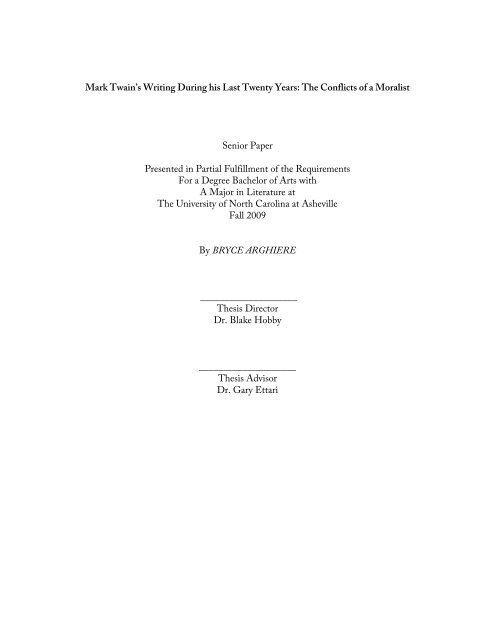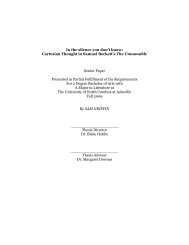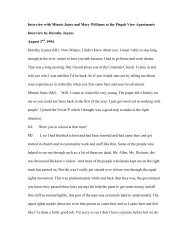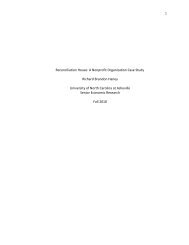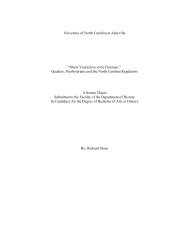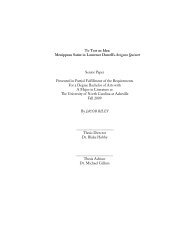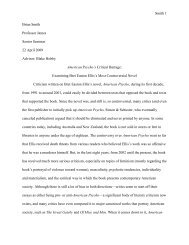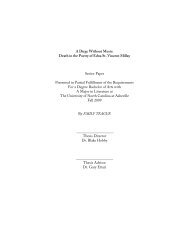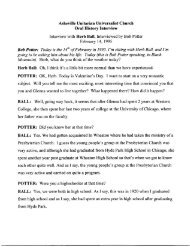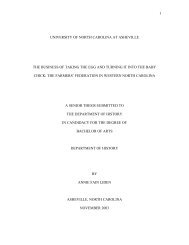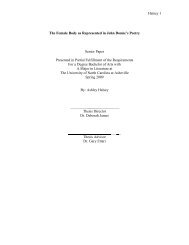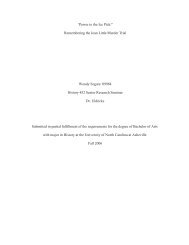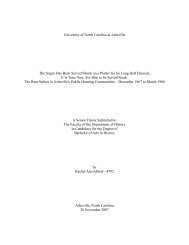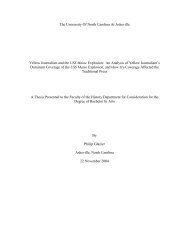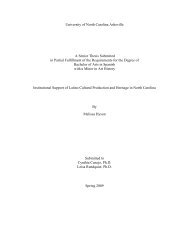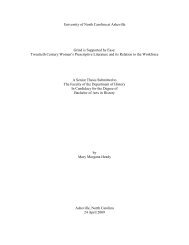Mark Twain's Writing During his Last Twenty Years: The Conflicts of ...
Mark Twain's Writing During his Last Twenty Years: The Conflicts of ...
Mark Twain's Writing During his Last Twenty Years: The Conflicts of ...
Create successful ePaper yourself
Turn your PDF publications into a flip-book with our unique Google optimized e-Paper software.
<strong>Mark</strong> Twain’s <strong>Writing</strong> <strong>During</strong> <strong>his</strong> <strong>Last</strong> <strong>Twenty</strong> <strong>Years</strong>: <strong>The</strong> <strong>Conflicts</strong> <strong>of</strong> a Moralist<br />
Senior Paper<br />
Presented in Partial Fulfillment <strong>of</strong> the Requirements<br />
For a Degree Bachelor <strong>of</strong> Arts with<br />
A Major in Literature at<br />
<strong>The</strong> University <strong>of</strong> North Carolina at Asheville<br />
Fall 2009<br />
By BRYCE ARGHIERE<br />
____________________<br />
<strong>The</strong>sis Director<br />
Dr. Blake Hobby<br />
____________________<br />
<strong>The</strong>sis Advisor<br />
Dr. Gary Ettari
Arghiere 2<br />
Unlike much <strong>of</strong> <strong>his</strong> earlier writing, most <strong>of</strong> <strong>Mark</strong> Twain’s later work presents a grim view<br />
<strong>of</strong> the human race. From roughly 1895 onwards, Twain’s writing contains few <strong>of</strong> the features for<br />
which it first gained recognition: frontier humor, as in “<strong>The</strong> Celebrated Jumping Frog <strong>of</strong><br />
Calaveras County” (1867); commentary on rural American life, as in <strong>The</strong> Adventures <strong>of</strong> Tom<br />
Sawyer (1876) and <strong>The</strong> Adventures <strong>of</strong> Huckleberry Finn (1884); and satirical social criticism, as in<br />
<strong>The</strong> Innocents Abroad (1869) and <strong>The</strong> Prince and the Pauper (1881). Rather, many <strong>of</strong> <strong>his</strong> later<br />
works deal with philosophical concerns: psychological egoism (the theory that all acts are<br />
primarily self-interested), determinism, and solipsism. <strong>The</strong>se concerns appear in Twain’s later<br />
correspondences; in <strong>The</strong> Mysterious Stranger Manuscripts (published posthumously in 1969), a<br />
collection <strong>of</strong> three unfinished narratives; and in What Is Man? (1906), a Socratic dialogue which<br />
Twain called <strong>his</strong> “Bible” (“535. Clemens To Howells” 689). By reviewing the philosophical ideas<br />
in these works we can gain insights into several conflicts in Twain’s writing which brought about<br />
a dramatic shift in style and a radically different depiction <strong>of</strong> the human race.<br />
Despite the wealth <strong>of</strong> criticism on Twain’s later works and views and on the conflicts<br />
inherent in them, few critics have explored in depth the significance <strong>of</strong> Twain’s passionate<br />
interest in several eighteenth- and nineteenth-century ideas and movements for <strong>his</strong> later thought,<br />
writing, and response to injustice and personal tragedy. A review <strong>of</strong> Twain’s letters, as well as a<br />
list <strong>of</strong> the authors he read and revisited, reveals that he held, especially later in life, a strong<br />
interest in rationalism, realism, Darwinism, social Darwinism, and empirical science. His works<br />
and ideas also bear many <strong>of</strong> the marks <strong>of</strong> naturalism, although he did not himself identify with<br />
the movement (<strong>Mark</strong> Twain and Science 210). On the whole, Twain’s interests reveal a<br />
predominantly materialistic conception <strong>of</strong> the universe. <strong>The</strong>se interests and t<strong>his</strong> conception, in
Arghiere 3<br />
conjunction with Twain’s devout sense <strong>of</strong> morality, may account for what is <strong>of</strong>ten perceived to be<br />
a cynical, deterministic, and solipsistic worldview, and for Twain’s tendency, in <strong>his</strong> later writing,<br />
to reduce immoral deeds and personal tragedies to explainable and unavoidable phenomena. On<br />
the one hand, these responses seem perfectly understandable, especially for a devoted moralist<br />
and family man like Twain. On the other hand, the passion and insistence with which Twain<br />
held to <strong>his</strong> theories and to <strong>his</strong> opinions <strong>of</strong> the human race, until <strong>his</strong> death, betrays both <strong>his</strong><br />
desperation to prove their validity and <strong>his</strong> ambivalence towards them (Parsons 71). Seen from<br />
t<strong>his</strong> perspective, Twain, as a moralist, intuitively revolted against the beliefs and theories which<br />
he upheld so vigorously for over fifteen years. In much <strong>of</strong> <strong>his</strong> later work, naturalistic and<br />
materialistic obsessions affect Twain’s writing: as Twain suffers tragedies and frustrations he<br />
encodes deterministic and solipsistic worldviews which conflict with <strong>his</strong> strong sense <strong>of</strong> morality.<br />
Among the works <strong>of</strong>ten assumed to reflect Twain’s late-life worldview are <strong>The</strong> Mysterious<br />
Stranger Manuscripts, which Twain wrote but never finished, and <strong>The</strong> Mysterious Stranger, A<br />
Romance (1916), a posthumously published and extensively edited short story which is a<br />
combination <strong>of</strong> the Manuscripts. William Gibson, editor <strong>of</strong> Twain’s Manuscripts, writes that <strong>The</strong><br />
Mysterious Stranger “is an editorial fraud perpetrated by Twain’s <strong>of</strong>ficial biographer and literary<br />
executor, Albert Bigelow Paine, and Frederick A. Duneka <strong>of</strong> Harper & Brothers publishing<br />
company” (1). Specifically, Gibson and others charge Paine and Duneka with changing the<br />
names and roles <strong>of</strong> several characters, rearranging and grafting portions <strong>of</strong> the manuscripts, and<br />
greatly shrinking the manuscripts—notably by cutting passages which may have <strong>of</strong>fended<br />
Catholics and Presbyterians (Gibson 2-3). In order to publish <strong>The</strong> Mysterious Stranger as Twain’s<br />
work (i.e. as a story completed by Twain but left unpublished), Paine and Duneka synthesized
Arghiere 4<br />
the Manuscripts, drawing heavily from the plot <strong>of</strong> <strong>The</strong> Chronicle <strong>of</strong> Young Satan to fill much <strong>of</strong> the<br />
narrative and using the solipsistic ending <strong>of</strong> No. 44, <strong>The</strong> Mysterious Stranger.<br />
Because the solipsistic ending <strong>of</strong> No. 44, <strong>The</strong> Mysterious Stranger connects almost<br />
seamlessly to the unfinished narrative <strong>of</strong> <strong>The</strong> Chronicle <strong>of</strong> Young Satan, <strong>The</strong> Mysterious Stranger<br />
would likely appear, to those unaware <strong>of</strong> the bowdlerization <strong>of</strong> the Manuscripts, to be an<br />
authentic text. Hence, as Gibson notes, the changes to the Manuscripts, although made largely by<br />
Paine, who was Twain’s biographer and loyal to him for many years, were made “in a fashion<br />
that almost certainly would have enraged Clemens” (3). Twain’s outrage would have surely been<br />
due in large part to <strong>his</strong> intentions for the Manuscripts, which he sought to combine into a<br />
narrative, as he writes in an 1899 letter to <strong>his</strong> friend William Howells,<br />
What I have been wanting is a chance to write a book which should take account <strong>of</strong> no<br />
one’s feelings, and no one’s prejudices, opinions, beliefs, hopes, illusions, delusions; a<br />
book which should say my say, right out <strong>of</strong> my heart, in the plainest language and<br />
without a limitation <strong>of</strong> any sort. I judged that that would be an unimaginable luxury,<br />
heaven on earth. (Fussell 96)<br />
Twain’s sense that it would be difficult for him to publish the Manuscripts as a book proves<br />
prophetic, as he never finished the Manuscripts, and they were never combined into a narrative<br />
that can be taken to convey accurately <strong>his</strong> beliefs. Nonetheless, the Manuscripts are unequivocally<br />
authored by Twain, and would seem, when taken together with What is Man?, to be <strong>his</strong><br />
definitive statement from the last years <strong>of</strong> <strong>his</strong> life.<br />
Many critics have attempted to account for the discrepancy between the tone <strong>of</strong> Twain’s<br />
writing prior to the last decade <strong>of</strong> the century and that during <strong>his</strong> last fifteen years. Some point to<br />
the hardships suffered by Twain during the last fifteen years <strong>of</strong> <strong>his</strong> life—<strong>his</strong> severe financial
Arghiere 5<br />
troubles, <strong>his</strong> old age and declining health, the nervous breakdown <strong>of</strong> one <strong>of</strong> <strong>his</strong> daughters, the<br />
death <strong>of</strong> two others, and the death <strong>of</strong> <strong>his</strong> wife—as an explanation for the <strong>of</strong>ten bitter and<br />
despairing outlook <strong>of</strong> <strong>his</strong> later writing (Waggoner 370). Others believe that Twain’s later writing<br />
reveals <strong>his</strong> exasperation as a moralist in a seemingly immoral and unjust world. Interestingly, as<br />
critics <strong>of</strong> t<strong>his</strong> belief note, the theory <strong>of</strong> determinism expressed in some <strong>of</strong> Twain’s works is <strong>of</strong>ten<br />
accompanied by an allowance for moral improvement (Jones 15). T<strong>his</strong> paradox suggests that<br />
perhaps Twain, a moralist at heart, grudgingly adopted a deterministic worldview as a retreat<br />
from <strong>his</strong> own hardships and from the moral depravation <strong>of</strong> the human race (“<strong>The</strong> <strong>The</strong>ology <strong>of</strong><br />
<strong>Mark</strong> Twain” 180). Moreover, Twain’s determinism, as still other critics note, conflicts, as it is a<br />
rational and mechanistic theory, with <strong>his</strong> imaginative ideas <strong>of</strong> the “dream-self” and a solipsistic<br />
reality, which he includes in the Manuscripts and contemplates in <strong>his</strong> letters (<strong>Mark</strong> Twain and<br />
Science 216). Many interpret t<strong>his</strong> conflict, too, as a retreat by Twain—t<strong>his</strong> time not from a tragic<br />
and immoral world but from a deterministic theory rendering injustice and immorality<br />
irremediable (“<strong>Mark</strong> Twain’s <strong>The</strong>ology” 240).<br />
As Twain, in the Manuscripts and in much <strong>of</strong> <strong>his</strong> other later writing, presents a cynical,<br />
deterministic, and solipsistic outlook on the human race and the world, many critics claim that<br />
<strong>his</strong> later work reflects <strong>his</strong> suffering and sense <strong>of</strong> guilt following a series <strong>of</strong> personal struggles and<br />
tragedies beginning in the 1890s. After several failed investments, including a $300,000 loss<br />
suffered from <strong>his</strong> investment in a typesetting machine (550), Twain, mired in debt and furious<br />
with businessmen and publishers who he felt had cheated him (Covici 549), traveled around the<br />
world with <strong>his</strong> wife Livy on several lecture tours to raise money. In 1896, while Twain and Livy<br />
were away on a lecture tour, one <strong>of</strong> their daughters contracted meningitis and died. Her death<br />
triggered severe emotional problems for Livy, who died while traveling with Twain in 1904. By
Arghiere 6<br />
1908, another <strong>of</strong> Twain’s daughters, who had recently developed epilepsy, drowned while<br />
bathing. Shorty after t<strong>his</strong>, another daughter, with whom Twain had a stormy relationship,<br />
suffered a nervous collapse (“Clemens, Samuel Langhorne” 61).<br />
Many critics and biographers believe that Twain felt guilt, as well as sorrow, surrounding<br />
these events. Twain, they suggest, felt that he could have done more to prevent the death <strong>of</strong> <strong>his</strong><br />
daughter in 1896, as <strong>his</strong> financial troubles, which forced him to embark on several worldwide<br />
lecture tours, were the ultimate reason that he decided to stay abroad rather than return home to<br />
be with <strong>his</strong> daughter during her illness (Covici 551). <strong>The</strong> choice to continue <strong>his</strong> lecture tour, as<br />
Harold Bush Jr. writes in <strong>his</strong> essay “‘Broken Idols’: <strong>Mark</strong> Twain’s Elegies for Susy and a Critique<br />
<strong>of</strong> Freudian Grief <strong>The</strong>ory,” was “one <strong>of</strong> the many decisions that [Twain] would bitterly regret for<br />
the rest <strong>of</strong> <strong>his</strong> life” (238). Twain’s regrets, as <strong>his</strong> daughter Clara Clemens notes in her book My<br />
Father, <strong>Mark</strong> Twain (1931), were compounded by <strong>his</strong> inclination to place blame on himself:<br />
“Self-condemnation was the natural turn for <strong>his</strong> mind to take, yet <strong>of</strong>ten he accused himself <strong>of</strong><br />
having inflicted pain or trouble when the true cause was far removed from himself” (Robinson<br />
145). As <strong>his</strong> tendency to place blame on himself suggests, Twain <strong>of</strong>ten showed a deep concern<br />
for the moral repercussions <strong>of</strong> <strong>his</strong> actions.<br />
Critics sometimes attribute Twain’s strong sense morality, as well as <strong>his</strong> sorrow and sense<br />
<strong>of</strong> guilt, to the bitter and deterministic tone <strong>of</strong> <strong>his</strong> later writing. Twain’s moral principles,<br />
exemplified notably by <strong>his</strong> defense <strong>of</strong> social justice, racial equality, and human and animal welfare,<br />
are evident both in <strong>his</strong> writing and <strong>his</strong> reputation. In <strong>The</strong> Prince and the Pauper, <strong>The</strong> Adventures <strong>of</strong><br />
Huckleberry Finn, <strong>The</strong> Tragedy <strong>of</strong> Pudd’nhead Wilson (1894), and even many <strong>of</strong> <strong>his</strong> works from<br />
1895 onwards, Twain questions and criticizes cruel and immoral social practices and patterns in<br />
human behavior. Because <strong>of</strong> <strong>his</strong> social criticism and social activism, Twain acquired the monikers
Arghiere 7<br />
“Moralist <strong>of</strong> the Main” (Webb 17) and, during <strong>his</strong> employment with numerous newspapers and<br />
magazines on the Pacific Coast, “Moralist <strong>of</strong> the Pacific Slope” (Hill 76). His reputation as a<br />
moralist is outlined in a eulogy, <strong>of</strong> unknown authorship, printed in June, 1910, two months after<br />
<strong>his</strong> death,<br />
<strong>The</strong> cause <strong>of</strong> political morality, freedom, human equality, honest government,<br />
democracy had in him a staunch and courageous defender. He took a deep<br />
interest in the social and industrial reforms <strong>of</strong> the day, and supported children’s<br />
theaters, social settlements and similar welfare work. He was an enemy <strong>of</strong><br />
snobbery, solemn pedantry, cant and corruption in public and commercial life.<br />
His death removed a salutary, beneficent force, a rare, if not unique, personality.<br />
(“<strong>The</strong> Death <strong>of</strong> <strong>Mark</strong> Twain” 237)<br />
As evidenced by <strong>his</strong> comments in an 1898 letter to Howells, Twain, as a defender <strong>of</strong> numerous<br />
political, social, and moral causes, was infuriated by the vices and moral depravity <strong>of</strong> the human<br />
race, “I suspect that to you there is still dignity in human life, and that man is not a joke—a poor<br />
joke—the poorest that was ever contrived” (Waggoner 370).<br />
In light <strong>of</strong> <strong>his</strong> frustration with the human race, Twain’s theory <strong>of</strong> determinism<br />
rationalizes <strong>his</strong> anger and thus reduces immoral deeds to unavoidable, and therefore less taxing,<br />
events. As a moralist, Twain, perhaps overwhelmed by the seeming cruelty <strong>of</strong> the human race,<br />
adopted, as he writes in <strong>his</strong> notebook in 1904, a social Darwinian, might makes right view<br />
because its moral ramifications,<br />
<strong>The</strong>re is no such thing as morality; it is not immoral for the tiger to eat the wolf,<br />
or the wolf the cat, or the cat the bird, and so on down; that is their business. . . .<br />
It is not immoral for one nation to seize another nation by the force <strong>of</strong> arms, or
Arghiere 8<br />
for one man to seize another man’s property or life if he is strong enough and<br />
wants to take it. (“<strong>Mark</strong> Twain’s Social Darwinism” 168)<br />
Denying the existence <strong>of</strong> morality does not seem to have been sufficient, by itself, to satisfy<br />
Twain’s desired ends, as it appears that he was interested in extricating himself and the human<br />
race from responsibility for regrettable or immoral acts. To make a persuasive claim against<br />
human responsibility, and to thus assuage <strong>his</strong> sense <strong>of</strong> guilt and <strong>his</strong> anger towards the human<br />
race, Twain, as editor Pascal Covici suggests, turned to a set <strong>of</strong> mechanistic beliefs: “If people are<br />
simply the result <strong>of</strong> what training or environment makes <strong>of</strong> the original raw material, as Twain’s<br />
fictions and characters come more and more to suggest and assert, then no basis for moral<br />
outrage exists” (549). Covici, however, <strong>of</strong>fers only a broad reference to Twain’s deterministic<br />
beliefs, which play an important role in much <strong>of</strong> <strong>his</strong> later writing.<br />
In <strong>his</strong> letters and in What Is Man?, Twain most clearly details the theory <strong>of</strong> determinism<br />
many believe he adopted to absolve himself and the human race <strong>of</strong> guilt. In What Is Man?,<br />
Twain outlines a theory <strong>of</strong> determinism as he writes on human nature: “Whatsoever a man is, is<br />
due to <strong>his</strong> make, and to the influences brought to bear upon it by <strong>his</strong> heredities, <strong>his</strong> habitat, <strong>his</strong><br />
associations. He is moved, directed, COMMANDED, by exterior influences—solely. He<br />
originates nothing, not even a thought” (337). Twain adds, in a 1909 letter to Howells: “I like to<br />
see my mind perform according to the law which I have laid down in ‘What Is Man’: the law<br />
that the mind works automatically, & plans & perfects many a project without its owner<br />
suspecting what it is about; the mind being merely a machine, & not in even the slightest degree<br />
under the control <strong>of</strong> its owner or subject to <strong>his</strong> influence” (“To W.D. Howells” 844). Although<br />
the mind, as Twain writes, is “merely a machine” and uncontrollable to its subject, Twain allows,<br />
in What Is Man?, for “free choice:” “<strong>The</strong> mind can freely select, choose, point out the right and just
Arghiere 9<br />
[choice]—its function stops there. It can go no further in the matter. It has no authority to say<br />
that the right one shall be acted upon and the wrong one discarded. That authority is in other<br />
hands.” Namely, as Twain writes, the authority to act on a choice lies with “the machine which<br />
stands for [man]. In t<strong>his</strong> born disposition and the character which has been built around it by<br />
training and environment” (388). Twain thus eliminates free will, as the mind, while able to<br />
differentiate between right and wrong, is powerless to disagree with the course <strong>of</strong> action<br />
prescribed by outside influences, such as “disposition,” “character,” “training,” and<br />
“environment.” Hence, Twain describes the human race, as he writes in a 1904 letter to <strong>his</strong><br />
friend Joseph Twichell, as essentially mechanistic: “For [the human race] did not make itself, it<br />
did not make its nature, it is merely a machine . . . moved wholly by outside influences . . . a<br />
helpless and irresponsible c<strong>of</strong>fee-mill ground by the hand <strong>of</strong> God” (Messent 397). <strong>The</strong>se<br />
comments to Twichell epitomize the theory <strong>of</strong> determinism in What is Man?.<br />
Those familiar with Twain’s later works note a slight difference between the theory <strong>of</strong><br />
determinism in What Is Man? and that in Twain’s Manuscripts. In <strong>The</strong> Chronicle <strong>of</strong> Young Satan,<br />
one <strong>of</strong> the Manuscripts, Satan states that “nothing can change the order <strong>of</strong> [any creature’s] life<br />
after the first event has determined it. That is, nothing will change it, because each act<br />
unfailingly begets an act, that act begets another, and so on to the end . . .” (115). <strong>The</strong><br />
noteworthy difference between t<strong>his</strong> theory and that in What Is Man? lies in Satan’s assertion that<br />
humans have volition over their first act. Twain makes no such concession in What Is Man? or in<br />
<strong>his</strong> letters, as the external forces <strong>of</strong> heredity and environment would presumably control one’s<br />
first act and, with the addition <strong>of</strong> experience, all acts thereafter. Despite the differences between<br />
the theories, the deterministic ideas espoused consistently by Twain in <strong>his</strong> letters and in What Is<br />
Man? correspond. He may have modified <strong>his</strong> theory for the Manuscripts merely to experiment
Arghiere 10<br />
with <strong>his</strong> deterministic ideas. In any event, Twain was absorbed with the notion <strong>of</strong> a deterministic<br />
reality.<br />
Twain’s theory <strong>of</strong> determinism, further, implicates self-interest—as shaped by<br />
uncontrollable external influences—as the primary factor in deciding behavior. Within <strong>his</strong><br />
discussion <strong>of</strong> determinism in What Is Man?, Twain presents a theory <strong>of</strong> psychological egoism:<br />
“From <strong>his</strong> cradle to <strong>his</strong> grave a man never does a single thing which has any FIRST AND<br />
FOREMOST object but one—to secure peace <strong>of</strong> mind, spiritual comfort, for HIMSELF” (343-44).<br />
“Spiritual comfort,” he explains, is attained by placating one’s conscience; he describes the<br />
conscience as follows: “Conscience—that independent Sovereign, that insolent absolute<br />
Monarch inside <strong>of</strong> a man who is the man’s Master. <strong>The</strong>re are all kinds <strong>of</strong> consciences because<br />
there are all kinds <strong>of</strong> men” (347). Heredity, environment, and experience, then, are determining<br />
factors, as they establish one’s self-interests and direct one’s conscience; they set the lengths to<br />
which one must go to satisfy “the imperious necessity <strong>of</strong> securing [one’s] own approval, in every<br />
emergency and at all costs” (352). A similar theory <strong>of</strong> psychological egoism is, moreover,<br />
suggested in <strong>The</strong> Chronicle <strong>of</strong> Young Satan, as <strong>The</strong>odor Fischer, the narrator, explains: “In any<br />
community, big or little, there is always a fair proportion <strong>of</strong> people who are not malicious or<br />
unkind by nature, and who never do unkind things except when they are overmastered by fear, or<br />
when their self-interest is greatly in danger, or some such matter as that” (82). Self-interest, or<br />
the need to content oneself, is thus a primary motive, in these works, regardless <strong>of</strong> the apparent<br />
altruism <strong>of</strong> an act.<br />
As Twain depicts all acts as self-interested and determined by heredity, environment, and<br />
experience, he renders human pride absurd and contemptible. William Macnoughton<br />
summarizes, in <strong>his</strong> book <strong>Mark</strong> Twain’s <strong>Last</strong> <strong>Years</strong> As a Writer, what many take to be Twain’s
Arghiere 11<br />
outlook on human pride, as he writes, “Man’s pride is unwarranted . . . because human<br />
achievements . . . depend to such a large extent on the luck <strong>of</strong> the draw in the games <strong>of</strong> heredity<br />
(which [Twain] calls temperament) and environment (or training)” (84). Twain seldom portrays<br />
humans as having no control over or responsibility for their acts without also commenting on<br />
human pride. For instance, in What Is Man? Twain writes:<br />
[Man’s] pride in himself, <strong>his</strong> sincere admiration <strong>of</strong> himself, <strong>his</strong> joy in what he supposed<br />
were <strong>his</strong> own and unassisted achievements, and <strong>his</strong> exultation over the praise and<br />
applause which they evoked—these have exalted him, enthused him, ambitioned him to<br />
higher and higher flights; in a word, made <strong>his</strong> life worth the living. But by your scheme,<br />
all t<strong>his</strong> is abolished; he is degraded to a machine, he is a nobody, <strong>his</strong> noble prides wither<br />
to mere vanities . . .. (397)<br />
Furthermore, in an 1899 letter to Howells in which Twain lists <strong>his</strong> intentions for the Manuscripts,<br />
he writes, “I believe I can make it tell what I think <strong>of</strong> Man, & how he is constructed, & what a<br />
shabby poor ridiculous thing he is, & how mistaken he is in <strong>his</strong> estimate <strong>of</strong> <strong>his</strong> character &<br />
powers & qualities & <strong>his</strong> place among the animals” (“536. Clemens To Howells” 698-99). Often,<br />
as in Satan’s remarks in <strong>The</strong> Chronicle <strong>of</strong> Young Satan, Twain comments on the baseness <strong>of</strong> the<br />
human race’s prized possession: the moral sense, “And yet [man] is such an unreasoning creature<br />
that he is not able to perceive that the Moral Sense degrades him to the bottom layer <strong>of</strong><br />
animated beings and is a shameful possession” (73). As he represents all accomplishments as<br />
driven solely by external influences, Twain portrays human pride, especially towards the moral<br />
sense—which he associates with vice and immorality—as contemptible.<br />
At first glance, Twain’s criticisms <strong>of</strong> human pride and the moral sense may appear to<br />
conflict with the deterministic theories presented in <strong>his</strong> works, in which humans are not
Arghiere 12<br />
responsible for their character or behavior. In <strong>his</strong> book <strong>Mark</strong> Twain: <strong>The</strong> Fate <strong>of</strong> Humor, James<br />
Cox comments that such a conflict does in fact exist in Twain’s writing:<br />
He is never able to integrate the two concepts. For the Moral Sense has to do<br />
with man’s pride, folly, and self-deception, whereas the deterministic thesis rests<br />
upon the undefined concept <strong>of</strong> a ‘first’ act which determines the rest <strong>of</strong> man’s<br />
existence. <strong>The</strong> Moral Sense is calculated to expose the folly <strong>of</strong> man; the<br />
deterministic thesis, on the other hand, must—if it is to be effective—be the plot<br />
<strong>of</strong> God. (280-81)<br />
Though one can gather from many <strong>of</strong> Twain’s remarks that he places blame on the human race,<br />
Twain seems to disapprove <strong>of</strong>, rather than blame, human beings for their immoral acts and<br />
feelings <strong>of</strong> pride. Indeed, he writes in a 1904 letter to Twichell, “I wish I could learn to<br />
remember that it is unjust and dishonorable to put blame upon the human race for any <strong>of</strong> its<br />
acts” (Messent 396). Twain’s contempt, it seems, is not for humans themselves, who as he writes<br />
“originate nothing,” but rather for their odious pride and “shameful” moral sense, cultivated in<br />
them entirely from the outside.<br />
Although Twain’s remarks on human pride and on the moral sense do not in fact seem to<br />
conflict with <strong>his</strong> deterministic obsessions, <strong>his</strong> suggestion, in What Is Man?, the human race seek<br />
moral improvement appears problematic for <strong>his</strong> theory. In What Is Man?, Twain, who earlier<br />
states that the human mind “is worked solely from the outside,” (338) includes a “plan for the<br />
general betterment <strong>of</strong> the race’s condition:” “Diligently train your ideals upward and still upward<br />
toward a summit where you will find your chiefest pleasure in conduct which, while contenting<br />
you, will be sure to confer benefits upon your neighbor and the community” (367). T<strong>his</strong> code<br />
would seem difficult for the human race to carry out, as Twain is clear and consistent in <strong>his</strong>
Arghiere 13<br />
discussion <strong>of</strong> the relationship between humans and their minds: “you not only did not make that<br />
machinery yourself, but you have not even any command over it” (338). Alexander Jones, in “<strong>Mark</strong><br />
Twain and the Determinism <strong>of</strong> What is Man?,” notes t<strong>his</strong> conflict: “T<strong>his</strong> concept <strong>of</strong> a selftraining<br />
machine may be untenable as a philosophical doctrine” (15). Despite the seeming<br />
contradiction in <strong>his</strong> ideas, Twain, after disclosing <strong>his</strong> “plan for the general betterment,” gives<br />
little clarification on the matter <strong>of</strong> externally operated “mental machinery” internally training its<br />
ideals (337). He suggests, in a parable, that humans seek external influences that will affect their<br />
“mental machinery” so that their self-interests will come more nearly in line with the interests <strong>of</strong><br />
others, but fails to explain how an externally influenced machine can seek anything <strong>of</strong> its own<br />
accord. As he gives a vague explanation <strong>of</strong> the matter <strong>of</strong> an externally-operated machine capable<br />
<strong>of</strong> “training its ideals upward,” Twain does little to dispel the sense that <strong>his</strong> theory <strong>of</strong><br />
determinism is incompatible with <strong>his</strong> “plan for the general betterment.”<br />
T<strong>his</strong> contradiction may reveal something <strong>of</strong> Twain’s ambivalence, as a moralist, towards<br />
<strong>his</strong> own philosophy. In “<strong>The</strong> <strong>The</strong>ology <strong>of</strong> <strong>Mark</strong> Twain: Banished Adam and the Bible,” Stanley<br />
Brodwin suggests that Twain’s deterministic doctrine is a means <strong>of</strong> coping with the moral<br />
depravity <strong>of</strong> the human race: “<strong>The</strong> determinism <strong>of</strong> What is Man? (1906) is merely a philosophic<br />
surrender to the theological truth <strong>of</strong> man playing and replaying Adam’s inevitable fall” (180).<br />
Twain’s subsequent efforts, then, to incorporate moral improvement into <strong>his</strong> deterministic<br />
worldview may suggest <strong>his</strong> awareness and concern that, as ethicist Kristin Shrader-Frechette<br />
argues, “failure to criticize indefensible or questionable values gives implicit assent to them” (636).<br />
Perhaps Twain, overwhelmed by the cruelty <strong>of</strong> the human race, devised a theory by which, in <strong>his</strong><br />
own words, “it is unjust and dishonorable to put blame upon the human race for any <strong>of</strong> its acts,”<br />
and then, pained by the immorality <strong>his</strong> doctrine permitted, attempted to reconcile <strong>his</strong>
Arghiere 14<br />
mechanistic ideas with <strong>his</strong> “plan for the general betterment” <strong>of</strong> the human race. If Twain were<br />
able to achieve persuasively t<strong>his</strong> synthesis, <strong>his</strong> theory would abrogate guilt and responsibility from<br />
human affairs while preserving moral improvement. In <strong>his</strong> efforts to pardon the human race for<br />
its cruel acts, Twain recoils to a theory <strong>of</strong> determinism, <strong>of</strong>ten, more specifically, by placing blame<br />
for the cruelty <strong>of</strong> human acts not on their perpetrators but on the moral sense. In <strong>The</strong> Chronicle <strong>of</strong><br />
Young Satan, for instance, Satan says <strong>of</strong> the moral sense, “Now what advantage can [man] get out<br />
<strong>of</strong> that? He is always choosing, and in nine cases out <strong>of</strong> ten he prefers the wrong. <strong>The</strong>re<br />
shouldn’t be any wrong; and without the Moral Sense there couldn’t be any” (72-73). While<br />
Twain’s claim that the moral sense and other externally-driven influences control human<br />
behavior may, by itself, be tenable, it is hardly compatible with <strong>his</strong> hopes for humanity’s moral<br />
improvement.<br />
<strong>The</strong> perceived inability <strong>of</strong> Twain’s philosophy to reconcile moral improvement and<br />
determinism may explain <strong>his</strong> receptivity to the idea <strong>of</strong> a solipsistic reality. In <strong>his</strong> article “<strong>Mark</strong><br />
Twain’s <strong>The</strong>ology: <strong>The</strong> Gods <strong>of</strong> a Brevet Presbyterian,” Brodwin considers t<strong>his</strong> possibility: “if<br />
human character is the creation <strong>of</strong> circumstances and ‘outside’ influences, then authentic reform<br />
will never be realized. <strong>The</strong>re is little doubt that Twain recognized t<strong>his</strong> problem, which is<br />
reflected in the final attempt to achieve reform . . . by at last retreating from the ‘real’ world into<br />
solipsism” (240). Yet Twain, as John Tuckey writes in <strong>Mark</strong> Twain and Little Satan: <strong>The</strong> <strong>Writing</strong><br />
<strong>of</strong> the Mysterious Stranger, “was probably more at home in the real world than <strong>his</strong> own words<br />
would sometimes suggest,” and doesn’t appear to have completely adopted a solipsistic worldview<br />
(81). Nonetheless, Twain, as he writes in <strong>his</strong> notebooks, pondered the existence <strong>of</strong> a dream-self<br />
capable <strong>of</strong> roaming freely across time and space, “When my physical body dies my dream body<br />
will doubtless continue its excursion and activities without change, forever” (Gibson 27).
Arghiere 15<br />
Furthermore, he <strong>of</strong>ten contemplated the notion <strong>of</strong> a solipsistic universe, as in a 1904 letter to<br />
Twichell:<br />
(A part <strong>of</strong> each day—or night) as they have been looking to me the past 7 years: as being<br />
NON-EXISTENT. That is, that there is nothing. That there is no God & no universe;<br />
that there is only empty space, & in it a lost & homeless & wandering & companionless<br />
& indestructible thought. And that I am that thought. And God, & the Universe, &<br />
Time, & Life, & Death, & Joy & Sorrow and Pain only a grotesque & brutal dream,<br />
evolved from the frantic imagination <strong>of</strong> that insane Thought. (Messent 395)<br />
T<strong>his</strong> passage bears a strong resemblance to 44’s comment at the end <strong>of</strong> Twain’s manuscript No.<br />
44, <strong>The</strong> Mysterious Stranger: “there is no God, no universe, no human race, no earthly life, no<br />
heaven, no hell. It is all a dream—a grotesque and foolish dream. Nothing exists but you. And<br />
you are but a thought—a vagrant thought, a useless thought, a homeless thought, wandering<br />
forlorn among the empty eternities!” (405). Indeed, the Manuscripts reveal much <strong>of</strong> Twain’s<br />
fascination with the idea <strong>of</strong> a dream universe: No. 44, <strong>The</strong> Mysterious Stranger and <strong>The</strong> Chronicle<br />
<strong>of</strong> Young Satan take place mostly in “Austria . . . far away form the world, and asleep” in a village<br />
which “drowsed in peace in the deep privacy <strong>of</strong> a hilly and woodsy solitude where news from the<br />
world hardly ever came to disturb its dreams” (35, 221). It appears, then, that Twain was fond <strong>of</strong><br />
the idea <strong>of</strong> a solipsistic, dream universe in which cruelty, immorality, determinism, and other<br />
“news from the world” could be but minor disturbances.<br />
Some critics have traced Twain’s apparent interest in solipsistic and deterministic ideas to<br />
<strong>his</strong> engagement with many rational and scientific movements <strong>of</strong> the nineteenth-century and with<br />
the undercurrent <strong>of</strong> scientific thought that would reach its apex towards the end <strong>of</strong> the century.<br />
In <strong>his</strong> book <strong>Mark</strong> Twain and Science, Sherwood Cummings notes the impact <strong>of</strong> science in
Arghiere 16<br />
American thought in the late nineteenth-century: “science around 1870. Its authority was<br />
immense. It was based on the compelling idea that the creation was reasonable, whole, and<br />
orderly. What is more, it worked. <strong>The</strong> marvelous technological progress <strong>of</strong> the time proved it”<br />
(10). As Paine indicates, Twain, who was fascinated with many <strong>of</strong> the technological<br />
advancements <strong>of</strong> <strong>his</strong> time, held an interest in science which “amounted to a passion” (“<strong>Mark</strong><br />
Twain’s Social Darwinism” 165). Furthermore, Twain is said to have read scientific articles and<br />
books assiduously, including those <strong>of</strong> nineteenth-century thinkers such as astronomer Simon<br />
Newcomb, geologist Nathaniel Shaler, biologist Ernst Haeckel, astronomer Garrett Serviss,<br />
physicist Sir Oliver Lodge, biologist Sir John Lubbock, Darwin, and T.H. Huxley (Waggoner<br />
361). Most significant among these names for Twain and <strong>his</strong> later writing are perhaps Darwin<br />
and Huxley.<br />
Twain’s theory <strong>of</strong> determinism, for instance, seems to bear the influence <strong>of</strong> Darwinian<br />
and evolutionary ideas. His theory, as it suggests that human beings are “moved, directed,<br />
COMMANDED, by exterior influences—solely” (337) and that the human “brain is so<br />
constructed that it can originate nothing whatever,” (“What Is Man?” 339) would seem to carry<br />
Darwin’s ideas on human evolution and natural selection to an extreme by attributing all human<br />
behavior and thought to natural, external influences such as heredity, training, and environment.<br />
Some <strong>of</strong> Twain’s interpretations <strong>of</strong> Darwinian and evolutionary ideas, in addition, evoke <strong>his</strong><br />
theory <strong>of</strong> determinism, as in a remark to Paine in 1906 on <strong>his</strong> feelings regarding Darwin’s theory<br />
on the descent <strong>of</strong> man, “We don’t create any <strong>of</strong> our traits; we inherit all <strong>of</strong> them” (“<strong>Mark</strong> Twain’s<br />
Social Darwinism” 167). T<strong>his</strong> comment undeniably parallels passages in What Is Man? such as,<br />
“Personally you did not create even the smallest microscopic fragment <strong>of</strong> the materials out <strong>of</strong><br />
which your opinion is made . . .” (337). <strong>The</strong> psychological egoism Twain includes in <strong>his</strong> theory
Arghiere 17<br />
<strong>of</strong> determinism, moreover, may have been derived from Darwin’s ideas on natural selection. As<br />
Michael Flescher and Daniel Worthen note in their book <strong>The</strong> Altruistic Species, natural selection<br />
is commonly taken, as a belief, to exclude altruistic behavior, “A Darwinian world is a world <strong>of</strong><br />
strife and competition, not a world <strong>of</strong> peace and self-sacrifice. So even if it seems that people<br />
occasionally act for the welfare <strong>of</strong> others, they are really motivated by some self-interested end”<br />
(59). It is reasonable to believe that Twain may have come to a similar conclusion, and thus<br />
incorporated self-interest into <strong>his</strong> theory <strong>of</strong> determinism. Furthermore, Twain’s theory <strong>of</strong><br />
determinism is reminiscent <strong>of</strong> some <strong>of</strong> Huxley’s evolutionary ideas, as evidenced by Huxley’s<br />
comments on natural causation in <strong>his</strong> book Evolution and Ethics (1894): “If the world is full <strong>of</strong><br />
pain and sorrow; if grief and evil fall, like the rain, upon both the just and the unjust; it is because,<br />
like the rain, they are links in the endless chain <strong>of</strong> natural causation by which past, present, and<br />
future are indissolubly connected” (Waggoner 366). Like Darwin and Huxley, Twain, in a sense,<br />
crafted a theory <strong>of</strong> natural causation, albeit a radical, deterministic one.<br />
Another thinker whose theory <strong>of</strong> natural causation had a significant influence on Twain’s<br />
thought is Hippolyte Taine, a French philosopher who was an important figure in the<br />
nineteenth-century American realist movement. “<strong>The</strong> French intellectual Hippolyte Taine<br />
(1828-1893),” as Sherwood Cummings writes in <strong>Mark</strong> Twain and Science, “was, through <strong>his</strong><br />
writings, a major shaper <strong>of</strong> <strong>Mark</strong> Twain’s ideas.” Cummings describes Taine’s theory <strong>of</strong> natural<br />
causation as follows:<br />
All aspects <strong>of</strong> existence—whether things or events, individual acts or <strong>his</strong>torical<br />
epochs, natural objects or works <strong>of</strong> art, measurable phenomena or private<br />
thought—are related. <strong>The</strong>y are all parts <strong>of</strong> a rational, pantheistic universe and are<br />
joined by chains <strong>of</strong> cause and effect. Every fact is at the same time the effect <strong>of</strong> its
Arghiere 18<br />
cause and the cause <strong>of</strong> a new but predictable effect. If people had enough<br />
information and wisdom, they might look ahead along the chain <strong>of</strong> cause and<br />
effect to see future developments. (68)<br />
Taine’s theory <strong>of</strong> natural causation closely resembles the theory <strong>of</strong> determinism in <strong>The</strong> Chronicle<br />
<strong>of</strong> Young Satan, in which the angel Satan tells <strong>The</strong>odor Fischer, “That is human life. A child’s<br />
first act knocks over the initial brick, and the rest will follow inexorably. If you could see into the<br />
future, as I can, you would see everything that was ever going to happen to that creature; for<br />
nothing can change the order <strong>of</strong> its life after the first event has determined it” (115). Although<br />
t<strong>his</strong> passage and Twain’s ideas on determinism may appear deistic or pantheistic, Twain never<br />
makes definitive claims about a Creator or deity. As the theory <strong>of</strong> determinism in the<br />
Manuscripts approximates Taine’s theory <strong>of</strong> natural causation, Twain’s deterministic obsessions<br />
likely owe much to Taine’s realist philosophical doctrines, which drew interest in America<br />
beginning around 1870 (<strong>Mark</strong> Twain and Science 69).<br />
Naturalism, as well as philosophical realism, seems to have provided the framework from<br />
which Twain constructed <strong>his</strong> late-life ideas and theories. Although Twain did not formally<br />
associate himself with the nineteenth-century, American literary naturalist movement, many <strong>of</strong><br />
<strong>his</strong> works and comments reveal sympathies with naturalist views (<strong>Mark</strong> Twain and Science 209-<br />
10). E.M. Adams, in <strong>his</strong> book Ethical Naturalism and the Modern World-View, classifies a<br />
naturalist position as one that “holds that human behavior (along with all other events) is, in<br />
principle at least, subject to scientific explanation and thus to its underlying naturalistic (or what<br />
I have called in a somewhat liberalized sense ‘mechanical’) theory <strong>of</strong> change.” Further, he adds,<br />
“If t<strong>his</strong> is so, every human act is determined by antecedent conditions in the physical world in<br />
accordance with the laws <strong>of</strong> ‘mechanical’ causality” (214). A naturalistic view in which “every
Arghiere 19<br />
human act is determined by antecedent conditions” would seem related to that expressed by<br />
Twain in many <strong>of</strong> <strong>his</strong> deterministic passages on the human race; for instance, “[Man] is a<br />
chameleon; by the law <strong>of</strong> <strong>his</strong> nature he takes the color <strong>of</strong> <strong>his</strong> place <strong>of</strong> resort. <strong>The</strong> influences about<br />
him create <strong>his</strong> preferences, <strong>his</strong> aversions, <strong>his</strong> politics, <strong>his</strong> tastes, <strong>his</strong> morals, <strong>his</strong> religion. He<br />
creates none <strong>of</strong> these things for himself” (“What Is Man?” 360). Interestingly, Twain’s own<br />
experience, especially in <strong>his</strong> later years, appears to substantiate <strong>his</strong> deterministic obsessions.<br />
A strong case can be made that late in life Twain embodies <strong>his</strong> own doctrine, as it<br />
appears that, in accepting naturalistic views, he took “the color <strong>of</strong> <strong>his</strong> place <strong>of</strong> resort” and that<br />
outside influences then shaped <strong>his</strong> beliefs and theories. <strong>The</strong> outside influences <strong>of</strong> personal<br />
tragedy and human cruelty seem to have precipitated Twain’s change <strong>of</strong> focus, informed by a<br />
naturalistic perspective, first to a set <strong>of</strong> deterministic ideas then, despairing <strong>of</strong> the moral<br />
ramifications <strong>of</strong> a deterministic universe, to a set <strong>of</strong> solipsistic ones. Twain, as Coleman Parsons<br />
notes in <strong>his</strong> book <strong>The</strong> Background <strong>of</strong> the Mysterious Stranger, “tinkered with ideas, hoping to put<br />
together a combination that would make life bearable.” <strong>The</strong> ideas with which Twain tinkered<br />
seem to have been realistic and naturalistic ones, the prevailing ideas <strong>of</strong> late nineteenth-century<br />
America. Perhaps not coincidentally, then, as Parsons adds, Twain’s later “thought was not<br />
constructive but destructive, its end being exculpation and protection, its means negation <strong>of</strong> free<br />
will, conscience, and finally life itself” (69). Ultimately, a realistic and naturalistic perspective<br />
seems to have been at the foundation <strong>of</strong> the mechanistic and “destructive” focus <strong>of</strong> Twain’s later<br />
writings.<br />
<strong>The</strong> destructive, reductionist nature <strong>of</strong> Twain’s later writing contributes to its bitter and<br />
despairing commentaries on the human race, the world, and the universe. A deterministic
Arghiere 20<br />
perspective reduces all experience, in the terminology <strong>of</strong> economist E.F. Schumacher, to a series<br />
<strong>of</strong> “convergent problems:”<br />
Convergent problems . . . do not, as such, exist in reality, but are created by a<br />
process <strong>of</strong> abstraction. When they have been solved, the solution can be written<br />
down and passed on to others, who can apply it without needing to reproduce the<br />
mental effort necessary to find it. If t<strong>his</strong> were the case with human relations—in<br />
family life, economics, politics, education, and so forth—well, I am at a loss how<br />
to finish the sentence. <strong>The</strong>re would be no more human relations but only<br />
mechanical reactions; life would be a living death. (Small is Beautiful 102-03)<br />
Although he likely crafted <strong>his</strong> theory in order to abolish <strong>his</strong> sense <strong>of</strong> guilt, Twain’s deterministic<br />
obsessions appear to have either been unsuccessful in dispelling <strong>his</strong> sorrow and sense <strong>of</strong> guilt or,<br />
perhaps due to their reductive implications, to have further embittered him. Twain’s later<br />
notebooks reveal many <strong>of</strong> <strong>his</strong> opinions following <strong>his</strong> construction <strong>of</strong> a deterministic view: he<br />
writes, for instance, that “there is nothing kindly, nothing beneficent, nothing friendly in Nature<br />
toward any creature, except by capricious fits and starts; and that Nature’s attitude toward all life<br />
is pr<strong>of</strong>oundly vicious, treacherous, and malignant” (Waggoner 366), and notes in 1895, as he was<br />
on the verge <strong>of</strong> beginning the Manuscripts, “It is the strangest thing that the world is not full <strong>of</strong><br />
books that sc<strong>of</strong>f at the pitiful world, and the useless universe and violent, contemptible human<br />
race—books that laugh at the whole paltry scheme and deride it” (Tuckey 26). As they were<br />
written following <strong>his</strong> construction <strong>of</strong> a deterministic theory, the bitter opinions in Twain’s later<br />
notebooks seem to have been effected by <strong>his</strong> deterministic obsessions.<br />
If Twain, as a principally realistic and naturalistic thinker, constructed <strong>his</strong> theory <strong>of</strong><br />
determinism as a religion, <strong>of</strong> sorts, to sustain him during a sorrowful period <strong>of</strong> <strong>his</strong> life, then it
Arghiere 21<br />
seems that <strong>his</strong> strong faith in naturalistic views may have led him, in a time <strong>of</strong> suffering, to<br />
embrace a doctrine <strong>of</strong> reduction and despair. A despairing outlook, as Schumacher argues in <strong>his</strong><br />
book A Guide for the Perplexed, is bound up with a materialistic worldview:<br />
A person . . . entirely fixed in the philosophy <strong>of</strong> materialistic Scientism, denying<br />
the reality <strong>of</strong> ‘invisibles’ and confining <strong>his</strong> attention solely to what can be counted,<br />
measured, and weighed, lives in a very poor world, so poor that he will experience<br />
it as a meaningless wasteland unfit for human habitation. Equally, if he sees it as<br />
nothing but an accidental collocation <strong>of</strong> atoms, he must needs agree with<br />
Bertrand Russell that the only rational attitude is one <strong>of</strong> ‘unyielding despair’. (34)<br />
Although it is difficult to speculate on the truthfulness <strong>of</strong> Schumacher’s absolute statements (e.g.<br />
‘he will experience it as . . .’ and ‘he must needs agree . . .’), Twain’s late-life writings instantiate<br />
Schumacher’s claims. Clearly, Twain, towards the end <strong>of</strong> <strong>his</strong> life, found the “only rational<br />
attitude” to be one <strong>of</strong> pessimism and despair. A number <strong>of</strong> <strong>his</strong> works and comments evince <strong>his</strong><br />
belief in the incompatibility <strong>of</strong> rationality and happiness. For instance, in <strong>The</strong> Chronicle <strong>of</strong> Young<br />
Satan, Satan, aiming to provide Father Peter with a favorable future, contents Father Peter in<br />
only way possible: he unseats <strong>his</strong> reason. After <strong>The</strong>odor Fischer asks Satan if there were any<br />
other way he could have gone about improving Father Peter’s future, Satan replies, “Are you so<br />
unobservant as not to have found out that sanity and happiness are an impossible combination?<br />
No sane man can be happy, for to him life is real, and he sees what a fearful thing it is” (163-64).<br />
Twain echoes Satan’s remarks, further, in a 1905 letter to Twichell, as he writes, “When a man is<br />
a pessimist before 48 he knows too much; if he is an optimist after it, he knows too little”<br />
(Messent 400). Although Twain’s comments to Twichell were perhaps made in jest, they<br />
nonetheless seem to epitomize <strong>his</strong> feelings on the effects <strong>of</strong> knowledge in a deterministic world.
Arghiere 22<br />
Despite some <strong>of</strong> its grim ramifications, Twain passionately defended <strong>his</strong> theory <strong>of</strong><br />
determinism until <strong>his</strong> death, steadfastly denying the compatibility <strong>of</strong> religious ideas with the<br />
scientific ideas which seem to have informed <strong>his</strong> theory. Although he attended church regularly<br />
for brief periods earlier in <strong>his</strong> life, Twain later insisted that “When religion and science elect to<br />
live together, it is a plain case <strong>of</strong> adultery” (Harnsberger 13). He likely held t<strong>his</strong> opinion, or one<br />
close to it, for at least the final twenty years <strong>of</strong> <strong>his</strong> life. While Twain was able to reason<br />
consistently in favor <strong>of</strong> the opinions and beliefs presented in <strong>his</strong> writing, some doubt exists as to<br />
whether he viscerally accepted them. “<strong>The</strong> very vehemence with which Twain supported<br />
determinism and denied free will operating through conscience and the Moral Sense,” as Parsons<br />
notes, “reveals unsureness” (71). Perhaps Twain’s uncertainty, if he indeed had any, towards the<br />
deterministic ideas in <strong>his</strong> works lay in their conflict with <strong>his</strong> moral principles. His frequent<br />
contemplation <strong>of</strong> solipsistic ideas, after all, would appear to suggest <strong>his</strong> dissatisfaction with <strong>his</strong><br />
deterministic doctrine. In <strong>his</strong> book Small is Beautiful: Economics as if People Mattered, Schumacher<br />
comments on the ambivalence—which Twain perhaps felt—<strong>of</strong> many towards the leading ideas<br />
<strong>of</strong> the nineteenth-century: “We have become confused as to what our convictions really are. <strong>The</strong><br />
great ideas <strong>of</strong> the nineteenth century may fill our minds in one way or another, but our hearts do<br />
not believe in them all the same. Mind and heart are at war with one another, not, as is<br />
commonly asserted, reason and faith” (98). For Twain, it seems, the more important battle was<br />
always that between reason and faith. Despite <strong>his</strong> despairing comments on the human race and<br />
on the universe, he never seems to acknowledge any tension between <strong>his</strong> convictions and desires.<br />
In fact, in What Is Man?, he trivializes beliefs as compared to temperament, thus removing any<br />
conflict between the two: “Beliefs? Mere beliefs? Mere convictions? <strong>The</strong>y are powerless. <strong>The</strong>y<br />
strive in vain against inborn temperament” (398). <strong>The</strong> irony <strong>of</strong> t<strong>his</strong> passage lies in Twain’s denial
Arghiere 23<br />
<strong>of</strong> the importance <strong>of</strong> beliefs in a work where he outlines the very justifications he has used to<br />
cope with frustration and tragedy. As evidenced by <strong>his</strong> earlier works and demeanor, the dark<br />
vision which Twain’s late works reflect coincides with <strong>his</strong> change in temperament. While some<br />
may see t<strong>his</strong> change as a kind <strong>of</strong> awakening, it is also possible that Twain, having greatly<br />
underestimated the significance <strong>of</strong> <strong>his</strong> naturalistic convictions, constructed a deterministic theory<br />
that placed him in an amoral quandary, leaving him conflicted about <strong>his</strong> own self and beliefs, and<br />
at odds with a misunderstanding world.<br />
Works Cited<br />
Adams, E.M. Ethical Naturalism and the Modern World-View. Chapel Hill, NC: University <strong>of</strong><br />
North Carolina Press, 1960.<br />
Brodwin, Stanley. “<strong>Mark</strong> Twain’s <strong>The</strong>ology: <strong>The</strong> God’s <strong>of</strong> a Brevet Presbyterian.” <strong>The</strong> Cambridge<br />
Companion to <strong>Mark</strong> Twain. Ed. Forrest G. Robinson. New York: Cambridge University<br />
Press, 1995. 220-48.<br />
Brodwin, Stanley. “<strong>The</strong> <strong>The</strong>ology <strong>of</strong> <strong>Mark</strong> Twain: Banished Adam and the Bible.” Critical<br />
Essays on <strong>Mark</strong> Twain, 1910-1980. Ed. Louis J. Budd. Boston: G.K. Hall, 1983.<br />
Bush, Harold K. Jr. “‘Broken Idols’: <strong>Mark</strong> Twain’s Elegies for Susy and a Critique <strong>of</strong> Freudian<br />
Grief <strong>The</strong>ory.” Nineteenth-Century Literature 57.2 (2002): 237-68.<br />
“Clemens, Samuel Langhorne 1835-1910.” Something About the Author. Vol. 100. Ed. Alan<br />
Hedblad. Detroit, MI: Gale, 1999. 52-62.<br />
Covici, Pascal. “<strong>Mark</strong> Twain (Samuel Langhorne Clemens).” Dictionary <strong>of</strong> Literary Biography.<br />
Vol. 11. Ed. Stanley Trachtenberg. Detroit, MI: Gale, 1982. 526-55.<br />
Cox, James Melville. <strong>Mark</strong> Twain: <strong>The</strong> Fate <strong>of</strong> Humor. Princeton, NJ: Princeton University Press,<br />
1966.
Arghiere 24<br />
Cummings, Sherwood. <strong>Mark</strong> Twain and Science. Baton Rouge, LA: Louisiana State University<br />
Press, 1988.<br />
Cummings, Sherwood. “<strong>Mark</strong> Twain’s Social Darwinism.” <strong>The</strong> Huntington Library Quarterly<br />
20.2 (1957): 163-75.<br />
Flescher, Andrew Michael, and Daniel L. Worthen. <strong>The</strong> Altruistic Species: Scientific, Philosophical,<br />
and Religious Perspectives <strong>of</strong> Human Benevolence. Philadelphia: Templeton Foundation<br />
Press, 2007.<br />
Fussell, E.S. “<strong>The</strong> Structural Problem <strong>of</strong> ‘<strong>The</strong> Mysterious Stranger’.” Studies in Philology 49.1<br />
(1952): 95-104.<br />
Gibson, William M. “Introduction.” <strong>The</strong> Mysterious Stranger Manuscripts. Ed. William M.<br />
Gibson. Berkeley, CA: University <strong>of</strong> California Press, 1969. 1-34.<br />
Hansberger, Caroline Thomas. <strong>Mark</strong> Twain’s View <strong>of</strong> Religion. 1 st Ed. Evanston, IL: <strong>The</strong> Schori<br />
Press, 1961.<br />
Hill, Hamlin. “Samuel Langhorne Clemens (<strong>Mark</strong> Twain).” Dictionary <strong>of</strong> Literary Biography. Vol.<br />
12. Ed. Donald Pizer, and Earl Harbert. Detroit: Gale, 1982. 71-94.<br />
Jones, Alexander E. “<strong>Mark</strong> Twain and the Determinism <strong>of</strong> What is Man?.” American Literature<br />
29.1 (1957): 1-17.<br />
Macnaughton, William R. <strong>Mark</strong> Twain’s <strong>Last</strong> <strong>Years</strong> as a Writer. Columbia, MO: University <strong>of</strong><br />
Missouri Press, 1979.<br />
Messent, Peter. “<strong>Mark</strong> Twain, Joseph Twichell, and Religion.” Nineteenth-Century Literature<br />
58.3 (2003): 368-402.<br />
Parsons, Coleman O. “<strong>The</strong> Background <strong>of</strong> the Mysterious Stranger.” American Literature 32.1<br />
(1960): 55-74.
Arghiere 25<br />
Robinson, Forrest G. “<strong>The</strong> Jester and the Sage: Twain and Nietzsche.” Nineteenth-Century<br />
Literature 60.2 (2005): 137-62.<br />
Schumacher, E.F. A Guide for the Perplexed. New York: Harper & Row, 1978.<br />
Schumacher, E.F. Small is Beautiful: Economics as if People Mattered. 2 nd Ed. New York: Harper<br />
& Row, 1989.<br />
Shrader-Frechette, Kristen. “An Apologia for Activism: Global Responsibility, Ethical Advocacy,<br />
and Environmental Problems.” <strong>The</strong> Environmental Ethics and Policy Book. 3 rd Ed. Ed.<br />
Donald VanDeVeer, and Christine Pierce. Belmont, CA: Wadsworth, 2003. 634-43.<br />
“<strong>The</strong> Death <strong>of</strong> <strong>Mark</strong> Twain.” Critical Essays on <strong>Mark</strong> Twain, 1867-1910. Ed. Louis J. Budd.<br />
Boston: G.K. Hall, 1982. 236-37.<br />
Tuckey, John Sutton. <strong>Mark</strong> Twain and Little Satan. West Lafayette, IN: Purdue University<br />
Studies, 1963.<br />
Twain, <strong>Mark</strong>. “535. Clemens To Howells.” <strong>Mark</strong> Twain-Howells Letters: <strong>The</strong> Correspondence <strong>of</strong><br />
Samuel L. Clemens and William D. Howells, 1872-1910. Vol. 2. Ed. Henry Nash Smith,<br />
and William M. Gibson. Cambridge, MA: <strong>The</strong> Belknap Press <strong>of</strong> Harvard University<br />
Press, 1960. 689-94.<br />
Twain, <strong>Mark</strong>. “536. Clemens To Howells.” <strong>Mark</strong> Twain-Howells Letters: <strong>The</strong> Correspondence <strong>of</strong><br />
Samuel L. Clemens and William D. Howells, 1872-1910. Vol. 2. Ed. Henry Nash Smith,<br />
and William M. Gibson. Cambridge, MA: <strong>The</strong> Belknap Press <strong>of</strong> Harvard University<br />
Press, 1960. 694-99.<br />
Twain, <strong>Mark</strong>. “No. 44, <strong>The</strong> Mysterious Stranger.” <strong>The</strong> Mysterious Stranger Manuscripts. Ed.<br />
William Gibson. Berkeley, CA: University <strong>of</strong> California Press, 1969. 221-405.
Arghiere 26<br />
Twain, <strong>Mark</strong>. “<strong>The</strong> Chronicle <strong>of</strong> Young Satan.” <strong>The</strong> Mysterious Stranger Manuscripts. Ed.<br />
William Gibson. Berkeley, CA: University <strong>of</strong> California Press, 1969. 35-174.<br />
Twain, <strong>Mark</strong>. “To W.D. Howells.” <strong>Mark</strong> Twain-Howells Letters: <strong>The</strong> Correspondence <strong>of</strong> Samuel L.<br />
Clemens and William D. Howells, 1872-1910. Vol. 2. Ed Henry Nash Smith, and William<br />
M. Gibson. Cambridge, MA: <strong>The</strong> Belknap Press <strong>of</strong> Harvard University Press, 1960.<br />
844-46.<br />
Twain, <strong>Mark</strong>. “What Is Man?.” <strong>The</strong> Complete Essays <strong>of</strong> <strong>Mark</strong> Twain. Ed. Charles Neider. Garden<br />
City, NY: Doubleday, 1963. 335-99.<br />
Waggoner, Hyatt Howe. “Science in the Thought <strong>of</strong> <strong>Mark</strong> Twain.” American Literature 8.4<br />
(1937): 357-70.<br />
Webb, Charles Henry. “Advertisement.” Critical Essays on <strong>Mark</strong> Twain, 1867-1910. Ed. Louis J.<br />
Budd. Boston: G.K. Hall, 1982. 17.


